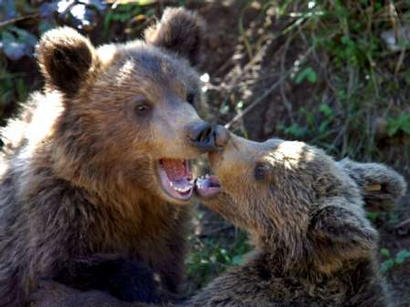Bear orphans find home inCroatian mountain village

Eight month old bear cubs called Ljubo (R) and Zdravko (L) play after lunch at Kuterevo bear orphanage at the foot of the biggest Croatian mountain, Velebit on September 19, 2003. There are four bears altogether at Kuterevo, being taken care of by volunteers who independently organized the refuge for orphaned bears from the Croatian and Bosnian mountains. REUTERS/Nikola Solic TO MATCH FEATURE STORY CROATIA-BEARS
29 Sep 2003 01:07:17 GMT
Bear orphans find home in Croat mountain village
--------------------------------------------------------------------------------
By Manja Segrt
KUTEREVO, Croatia, Sept 29 (Reuters) - The high-voltage barbed-wire fence enclosing the pen is not meant to protect the mountain villagers from the brown bears inside, but the other way round.
The four cubs it shelters, in what carers say is the Balkans' only bear orphanage, are too young to cause harm and are already so used to humans they cannot go back to the wild.
Croatia still has wilds where brown bears (ursus arctos) roam, numbering between 400 and 800. They can also be found in neighbouring Balkan states but have died out in most of Europe. They are not endangered but hunting is limited.
The refuge, founded last year in Kuterevo in the rough central woodlands, cares for cubs who get separated from their mothers or lose them to illegal hunters or to vehicles.
Their only chance of survival is to be raised by humans.
The orphanage currently looks after Janja Zora, Mrnjo Brundo, Zdravi Gor and Ljubo Lik, who have become tourist attractions and earned their patrons some 50,000 kuna ($7,600) in tickets, postcards, posters and T-shirts this summer.
USED TO HUMANS
The people who saved them cannot teach them "the bare necessities" -- how to make a den, find food or orient themselves -- so they cannot return to the wild on reaching adulthood.
"The biggest problem is that they get used to people, their smell and voice. They connect humans with food, and this often leads to conflict situations and bears end up being killed," said Djuro Huber, the refuge's expert adviser and a leading Croatian biologist.
Local zoos have enough bears and exporting them is made difficult by international regulations, so the chances are that the cubs will remain in Kuterevo for good.
Ivan Crnkovic, head of the orphanage, said there were other refuges in Bulgaria, Romania, Turkey and Greece, but those are for adult bears "that were abused and mistreated, used for entertainment by street performers".
Some European countries where bears are extinct in the wild, like the Netherlands or Germany, have bear parks, but none with the sole purpose of taking in cubs.
The shelter was started in 2002 by sociologist Vladimir Lay. "I discussed it with experts and concluded there was a real need to help baby bears and this region's economy," he said.
PLAYFUL BUT GROWING
Mrnjo Brundo was the first to arrive. When he came, Crnkovic introduced him to the 700-strong local community of this remote mountain village and the people welcomed him warmly.
The 20-month-old is at ease with people and adores playing games with them, although he now weighs more than 300 kg (661 lb) and has grown to a size that inspires caution, if not outright fear, in visitors.
Janja Zora is the only female in the bunch and much less interested in humans, unless they bring food -- mostly fruit, bread and grass harvested from the Gacka river, a renowned fly-fishing spot. Only five percent of it is meat.
Ljubo Lik and Zdravi Gor, both eight months old, spend most of their time playing. Ljubo was starving and barely alive when locals found him. "He wouldn't have lasted another week alone," Crnkovic said.
Still, he bravely attacks his bigger and much calmer friend Zdravi, who, Crnkovic said admiringly, is "the kindest of the four. What a bear he will become!"
After running around, wrestling and eating all the grass and acorn the caretakers bring them, the two younger cubs often share a bath in a wooden trough.
BEAR CLASSES
For each generation of bears there will be a separate living area, trying to provide the best possible natural habitat, expanding in size as they grow and move from grades one to four, the age when they reach sexual maturity. They will then be placed in a bear park that is yet to be built.
The project's creators hope to turn the refuge into an ecotourism venue, but insist their primary concern will always be the bears' welfare and not profit.
Brown bears are the largest wild animals living in Croatia. They have no natural enemies, except man. Their life expectancy is 20-30 years in the wilderness, although they can live up to 45 years in captivity.
http://www.alertnet.org/thenews/newsdesk/L25597529.htm